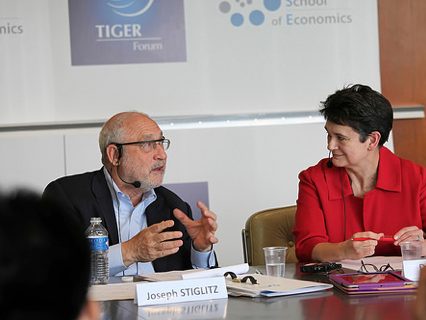Yesterday I attended the London launch of the annual UNDP Human Development Report – the title this year is [amazon_link id=”9211263689″ target=”_blank” ]Sustaining Human Progress: Reducing vulnerabilities and building resilience[/amazon_link]. The report notes the combination of advances in human development over the years – for most people in most countries – with a strong sense of precariousness in many places. This is not only because of economic uncertainty but also the risk of natural disasters, violence, corruption, ill health, industrial accidents. Poverty leaves people ill-equipped to respond to any of these shocks, and some groups such as the very old or young, or women or minorities, are particularly vulnerable.
One of the panellists was Richard Layard, talking about his new co-authored book [amazon_link id=”1846146054″ target=”_blank” ]Thrive[/amazon_link], which emphasises mental health as an over-looked but vital issue for people’s well-being. In his comments he said mental ill-health was responsible for more misery than unemployment or poverty in the rich countries, and possibly in poor countries too (although I think they are correlated). He described [amazon_link id=”1614271747″ target=”_blank” ]Maslow’s hierarchy of needs[/amazon_link] as “an appalling concept”: a sense of meaning in life is more fundamental than material needs, according to Lord Layard.
He went on to claim that recent well-being research in China shows that the least happy people are those who move from countryside to town, and seemed to be saying this should call into question China’s emphasis on economic growth. While China has certainly paid a high environmental price for industrial growth, and is characterised by great inequality and authoritarian politics, I would certainly challenge the Layard argument at this point. As Khalid Malik, the Director of the HDR pointed out, those discontents who move from countryside to town, to those grim-seeming jobs in factories, don’t want to return to the village.
What’s more, traditional rural societies usually have a gender hierarchy that makes towns far more attractive for women. This point emerged in the recent thoughtful BBC2 programme on garment manufacture in Bangladesh, Clothes to DIe For. Despite the Rana Plaza tragedy, young women still wanted factory jobs.
So why the higher self-reported dissatisfaction by Chinese urban migrants? I don’t know whether the research was able to rule out causality issues like whether the individuals were more dissatisfied and restless to start with, or whether there is something subtle going on with their answers to survey questions.
Of course one of the key attractions of the HDR is that the Human Development Index is exactly a measure that reduces the focus on GDP in favour of an indicator based on [amazon_link id=”0192893300″ target=”_blank” ]Amartya Sen’s concept of ‘capabilities'[/amazon_link], the resources and attributes needed to live a fulfilling life. The top five countries this year are Norway, Australia, Switzerland, Netherlands and the US. If you adjust for income inequality, the US slips 23 places and Germany becomes number 5. The expected quintet of sub-Saharan African countries (Niger, DRC, CAR, Chad and Sierra Leone) are ranked bottom. (Somalia, South Sudan and North Korea would be down there if there were data available.)

